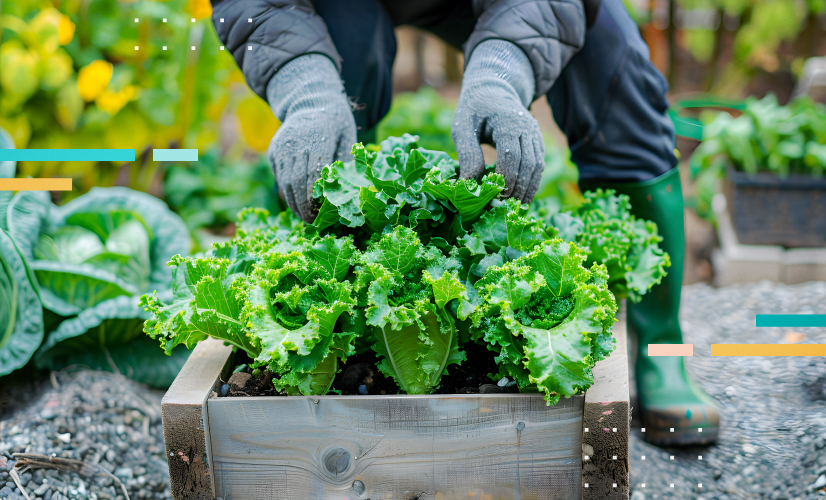Connecting Passions to Purpose: How to Turn Your Garden Into a Force for Good
May 16, 2025
7 min read
Exploring how everyday interests can inspire meaningful giving
Everyday interests can be powerful starting points for giving back in ways that feel natural and meaningful. Whether it’s baking, running, crafting or gardening, we believe that what you love can be a gateway to doing good.
In this post, we’re digging into gardening as an example. What if your backyard hobby could help build a healthier, more connected, and more sustainable world?
If you’ve ever felt the joy of tending a garden, the satisfaction of pulling carrots from the soil, the surprise of spotting a new bloom, or the calm that comes from a quiet moment among plants, then you already know how powerful gardening can be. But what if that power could extend beyond your fence line?
Your green thumb can cultivate more than just produce. It can also sow generosity, support local communities, and help restore the planet.
1. Share Your Harvest
Gardening often leads to abundance, zucchinis multiplying faster than you can eat them, tomatoes ripening all at once. Instead of letting extras go to waste, consider donating your surplus.
Many food banks, community fridges, and local pantries welcome fresh produce. In fact, fresh food is one of the most-needed—and least-donated—items. Your backyard bounty could become a lifeline for someone facing food insecurity.
For example:
- In Richmond, BC, the Richmond Food Bank Society directs donors with fresh produce to Urban Bounty, an organization that helps harvest and distribute backyard fruit and vegetables to people in need.
- In Toronto, ON, The Stop Community Food Centre grows food in their community gardens and greenhouse to supply their food bank and meal programs—and welcomes gardeners who want to donate excess produce or volunteer their time.
This simple act transforms your personal harvest into shared nourishment and helps strengthen your community, one tomato at a time.
And if you have more to share, like a heavily producing vegetable plot or fruit trees, you could be a valuable source for organizations that help distribute fresh food at scale. Large yields can make a big impact.
2. Think Beyond Your Backyard
If you’re looking to dig deeper, community gardens are a natural next step.
These vibrant green spaces don’t just beautify neighbourhoods, they often grow produce for shelters, meal programs, and food banks. They also rely on volunteers to plant, weed, water, and harvest. By donating your time, tools, or gardening know-how, you can help ensure that more people have access to fresh, healthy food.
And you don’t need a green thumb or gardening experience to get involved. Many community gardens welcome new volunteers, offer training, or need help beyond the soil, like organizing, outreach, or event planning. And in giving your time, you’ll often gain something in return—new skills, new friendships, and the sense of purpose that comes from seeing your efforts help others grow and thrive.
Not sure where to start? Try searching your city’s Parks & Recreation website for “community gardens” to find nearby opportunities.

3. Garden for the Planet
Your garden can also be a place where environmental change takes root.
By composting kitchen scraps, planting native or pollinator-friendly flowers, or saving and sharing seeds, you’re supporting sustainable practices that reduce waste and restore biodiversity. These small, mindful choices can build resilience against climate change and protect our planet’s future.
Whether you have a sprawling backyard or a few pots on a balcony, your choices matter.
4. Give Financially to Support Food and Environmental Causes
Not everyone has the time or space to garden, but that doesn’t mean you can’t still help nourish your community. If you’re looking for food security or environmental organizations to support, you can use your Impact Account to explore and give to charities aligned with these values, all in one place.
Financial donations to food banks, seed libraries, urban agriculture programs, or climate-focused nonprofits can extend your impact far beyond what’s possible with a single harvest. Your support might help expand access to land, provide tools and seeds to new growers, or fund educational programs around food justice and sustainability.
Giving financially also connects you to a wider movement. You’re not just supporting a cause, you’re investing in solutions and standing alongside others who care about food access, sustainability, and equity. And often, you’ll feel more connected and fulfilled knowing that your dollars are helping something meaningful take root.
How to Turn Any Interest Into Real Change
Gardening is just one example of how personal interests can become powerful vehicles for generosity. The key is to ask: What do I love doing, and how can it help others?
When we give in ways that reflect who we are, we’re more likely to keep giving and feel a deeper sense of meaning from it.

Here are a few ways to get started:
- Follow your joy: Hobbies you naturally enjoy are more likely to become sustainable ways to give back. For example, Véronique Séguin, our Manager of Donor Engagement and Experience, turned a glass bead course into a meaningful opportunity to volunteer at the Chilliwack Cultural Centre’s Open Glass Studio.
- Look for overlap: Identify where your interests intersect with community needs. Love running? Look into charity races. Big on baking? Explore food programs or fundraisers.
- Get curious: Use AI tools like ChatGPT to research causes, learn about local organizations, and discover how your passions can support change.
When you align your generosity with what already lights you up, giving feels less like a chore and more like a natural extension of who you are.
Let Your Passion Ripple Outward
Gardening brings joy, calm, and connection. But it can also be a powerful expression of generosity. Whether you donate extra produce, pitch in at a community plot, advocate for climate-smart practices, or make a financial gift to support food and environmental causes, your love of gardening can help grow a better world.
And if gardening isn’t your thing? That’s okay. Every interest has the potential to power good, you just need to find the right connection point.
Ready to explore how your interests could support a cause you care about? Start by checking out our guide on how to use AI to research causes and charities, and let your passion lead the way.

